Protect the Nation, Unite against the Pandemic
In December 2019, COVID-19 quickly spread from outbreaks in Asia to a global pandemic. By the end of May 2021, over 170 million people were infected and over 3.5 million people have passed away. According to the World Bank and International Monetary Fund, global economy slipped by over 4% in 2020, resulting in changes in consumer behaviors and the work-from-home model that led to restructuring of global supply chain. The pandemic caused substantive impact on corporate operation. FENC supplies the most cutting-edge materials to the global healthcare industry. During the pandemic, the Company established various anti-pandemic measures to minimize its impact.
Information disclosed reflects data collected from the reporting year.
Protecting public health by applying innovative materials towards pandemic-fighting products
FENC is capable of producing medical-grade personal protective equipment. During the pandemic, the Company ramped up the material supply, production and application.
The global pandemic has caused shortages in medical masks and anti-pandemic supplies. FENC developed innovative materials and anti-pandemic products, taking pandemic fighting to a new level. By offering products with the highest quality for healthcare workers and the public, FENC helps stop the spread of COVID-19 and protects public health.
To combat COVID-19, FENC applies its core strengths in the development of various anti-pandemic products, giving medical professionals and the public the best protection to safeguard public health. Currently, FENC produces the raw materials for medical-grade face masks in Taiwan and Shanghai. The products are sold worldwide, providing the most advanced quality material to global medical and health industries.
In addition, FENC donated NT$6 million to the Central Epidemic Command Center through non-profit foundation, fighting the pandemic alongside the members of the public.
In the past, most facemasks on the market were made of PP. FENC takes advantage of the suppleness of polyester-cotton, which is gentler on human skin, to produce hydrophilic, odorless, low pilling and hypoallergenic face masks that absorb droplets easily.
FENC pioneered the first “microfiber filter” in the world, which can be placed on top of the melt-blown non-woven fabric in the middle layer of face masks. Composed mainly of nanofiber, this product can be used repeatedly after rinsing, and blocks the larger particles such as PM2.5. It is also superior to regular medical masks when it comes to filtering bacteria, which is almost as effective as N95 masks while using 20% less melt-blown non-woven fiber in the middle layer. The microfiber is twice as effective in reducing breathing resistance. When used to produce N95 masks, it helps users breathe with ease and reduce discomfort.

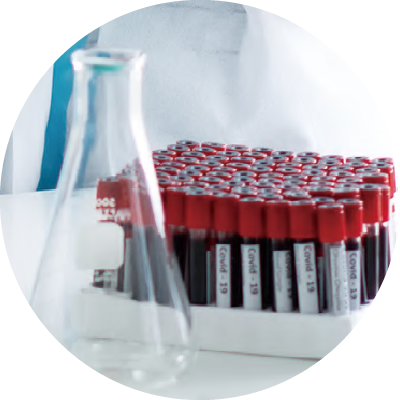
Medical workers must test blood samples for COVID-19 infections and the number of suspected cases has driven up demand for testing as well as testing supplies and materials, including blood collection tubes. Extra precautions must be taken to prevent unnecessary exposure to the virus. Glass is the conventional material for blood collection tubes. FENC developed an innovative PET material as replacement. It offers glass-like translucence with more durability. It is also easily transported and stored.
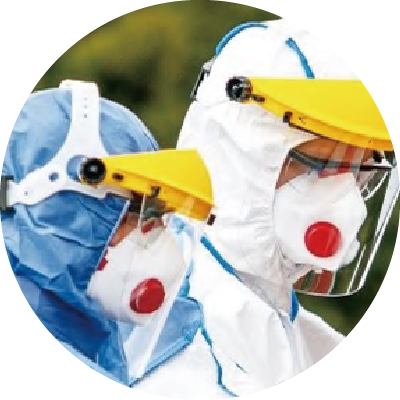
COVID-19 can be transmitted through exposure from the eyes, nose and mouth. Face masks offer a degree of protection for the general public. The healthcare professionals, however, are at a higher risk of exposure from droplets. FENC manufactures face shields with polyester film. The hydrophilic technology gives the product anti-fogging property, offering better vision and safety for medical professionals.
Regular medical gowns tend to be unbreathable and uncomfortable for healthcare professionals. Typically designed to be disposable, these gowns are not friendly to the environment. FENC pioneered protective gowns with odor managing fiber as well as breathable and waterproof coating. The gowns are also water-repellent and anti-bacterial. The odor control fiber is more durable, washable and environmental. The new gown reaches the highest standard, PB70 Level 4, which is impermeable by blood and the virus and greatly enhances strength and comfort.
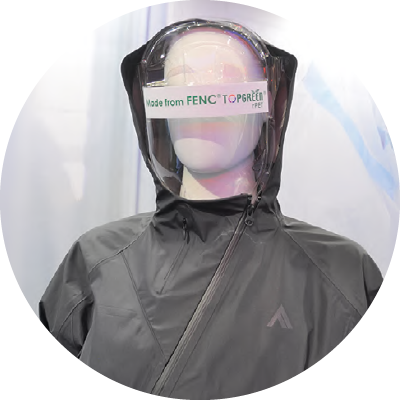
Protecting employee health with robust anti-pandemic measures
Since COVID-19 outbreaks erupted, global economic growth rate delivered negative numbers for the first time in 10 years. Early on, all FENC units responded by activating emergency response measures. Beginning in February 2020, all FENC sites followed the Company’s anti-pandemic policies to protect the health of all employees.
- Establishing effective anti-pandemic measures for critical moments
- Optimizing workflow to ensure steady capital
- Adjust product sales and service to maintain corporate profit
High-level executives formed emergency response teams to present regular status updates from all locations.
External personnel are not allowed to enter Company premises unless necessary.
Facemasks must be worn at all times upon entering Company premises.
Staff are divided to work on different days at separate locations.
Domestic and international business trips must be monitored.
The Company complies with governmental measures to ensure employee health and compliance.
All internal and external personnel entering Company premises must have the temperature taken and spray rubbing alcohol or sanitizer.
Staff must report to Employee Health and Care System daily to track health conditions.
The Company compiles and coordinates the collection of anti-pandemic supplies to ensure adequate protection for staff during business hours.
Production sites in China must set quarantine zones at staff dormitory for those returning from remote locations.
The Company accelerates digital transformation, including upgrading cloud system, video conferencing software and e-business system.
The short-term plan is to reduce unnecessary cash and capital expenditures; the mid and long-term plan is to improve loan structure to reduce liquidity and financing risks.
The Company introduced RPA to execute projects that required repetitive and systematic manual operation, minimizing restrictions on physical operations imposed by the pandemic.
The Company constructed customer and product profitability analysis system to optimize the ordering system.
The Company strengthens the tracking of account receivables and overdue to achieve zero bad debt during the pandemic.
The Company utilizes core strengths to promote its anti-pandemic products, mitigating impacts from sales decline in other areas.
Lockdowns around the world pose export barriers. The Company expands the domestic market and diversifies customer base to minimize risks.
The Company closely monitors cargo carriers, shipping companies and banks to ensure on time delivery.
Exemplary initiative that led WHFE out of the pandemic
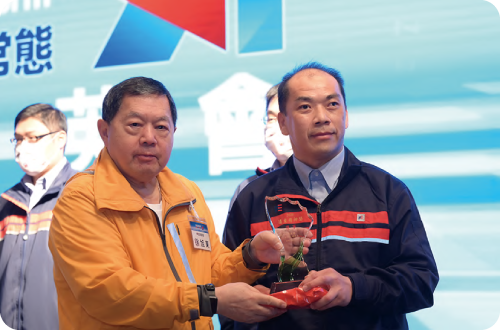 WHFE is a FENC production site located in Wuhan, Hubei Province in China, the epic center of the COVID-19 pandemic.
WHFE is a FENC production site located in Wuhan, Hubei Province in China, the epic center of the COVID-19 pandemic.
On January 23rd, 2020, the City of Wuhan declared a total lockdown. As the highest-ranking executive, Plant Manager Shang-Han Lu insisted on stationing at the plant with the security guards to protect Company property and collect anti-pandemic supplies. When the lockdown was finally lifted, Lu acted quickly to apply for plant reopening, making WHFE one of the first in Wuhan Economic and Technological Development Zone to reopen. The plant quickly returned to the pre-pandemic level of production.
Lu’s devotion and perseverance boosted the morale and solidarity, which was recognized in 2020 Far Eastern Spirit Award with Excellence in Exemplary Initiative.
FENV recognized with Outstanding Anti COVID-19 Award
On April 6th, 2020, FENV received Outstanding Anti COVID-19 Award presented by Vietnam General Confederation of Labour in Bình Phước Province. The award recognizes FENV for implementing effective anti-pandemic measures among industry peers in Bình Phước Province. The plant is one of the two enterprises winning this honor in Bình Phước Province.
Enhance anti-pandemic training with incentives for online learning
During the COVID-19 pandemic, the Suzhou City Government provided RMB$ 300 to $500 as incentives for those who completed online training. Production sites in Suzhou established training programs for the entire staff to fight the pandemic. Training includes pandemic prevention and control, safe production and regulatory requirements. Staff are encouraged to practice self-learning to enhance pandemic fighting skills. A total of 3,957 employees completed 73,088 hours of training.
Cohesion program for the new norm and new strategy in the post-pandemic era
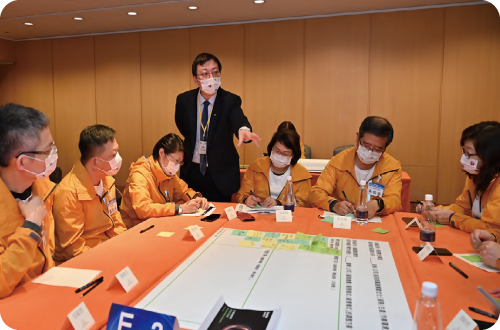 The Far Eastern Convention gathers corporate executives at the year end to monitor international trends in the post-pandemic era. Field experts are invited to share their foresights in global trends amid the COVID-19 pandemic. Deloitte Taiwan was also invited to conduct a one-day workshop with experts leading the interactive discussions and sharing sessions to formulate corporate strategies in response to the pandemic.
The Far Eastern Convention gathers corporate executives at the year end to monitor international trends in the post-pandemic era. Field experts are invited to share their foresights in global trends amid the COVID-19 pandemic. Deloitte Taiwan was also invited to conduct a one-day workshop with experts leading the interactive discussions and sharing sessions to formulate corporate strategies in response to the pandemic.
The original workshop format was designed by Deloitte Global for its global clients. This workshop, which entails Recovery and Beyond to explore new methodology in response to COVID-19, is customized for FENC to examine the impact of COVID-19 on key corporate operations, including changes in customer demand, cash flow management, supply chain adjustment, human resources optimization and digital transformation. By providing comprehensive assessments on corporate operations, the workshop helps the executives understand the post-pandemic approach toward corporate operation and formulate corresponding strategies.
During the event, experts facilitated in-depth discussions regarding FENC’s supply chain, digitization and customers, and explored ways of obtaining critical raw materials amid supply chain impact to avoid interruption in the production line. Also discussed are the establishment of smart factory and ways of reducing the impact from employees who are unable to return to work due to quarantine. Participants analyzed changes in customer demand during the pandemic and examined changing customer relations under the new norm. This workshop not only helps the executives stay informed on industry changes in the post-pandemic era, but also builds.








